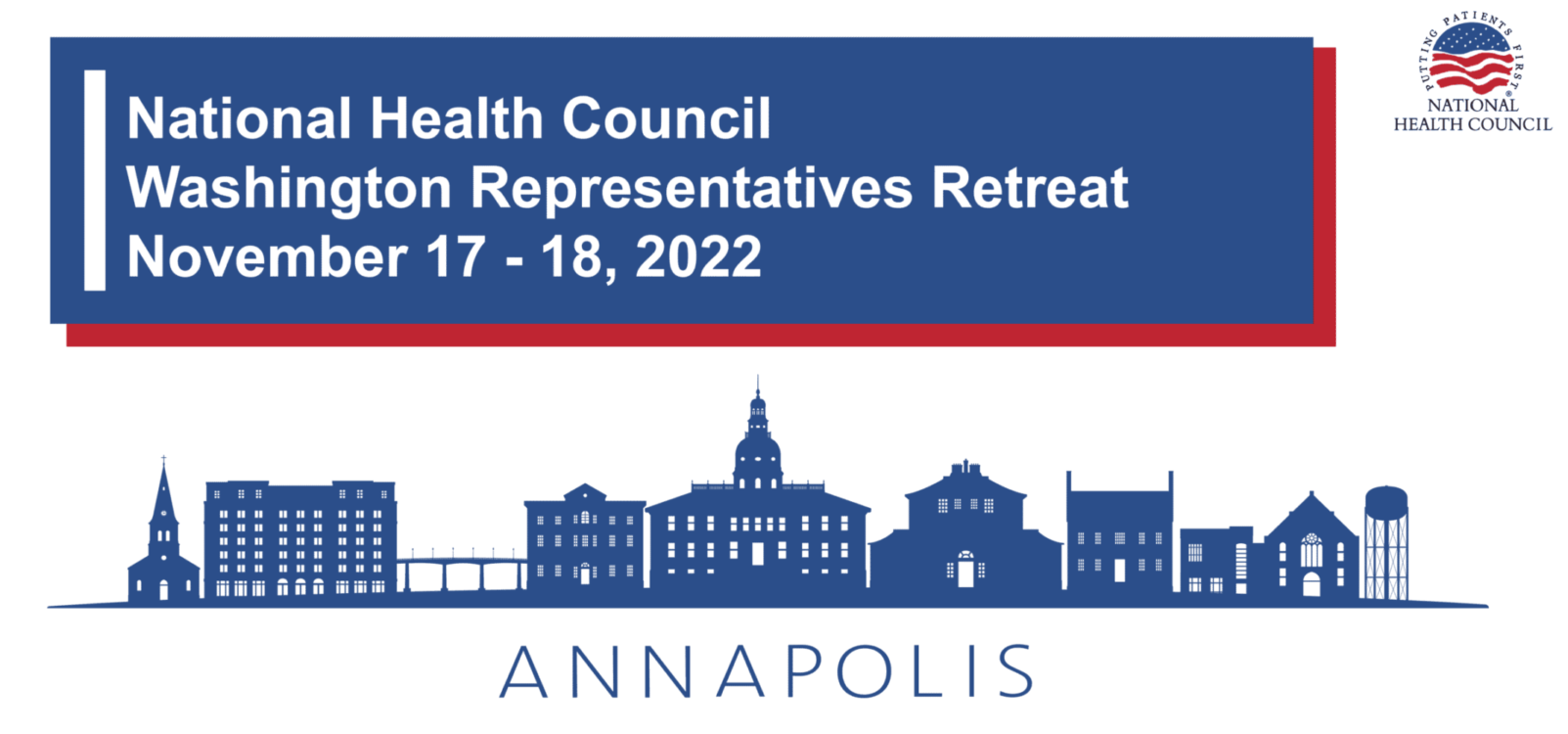

2022 Washington Representatives Retreat Recap
By: Allen Pinn, Coordinator, Policy
For the first time since the start of the COVID-19 pandemic, the NHC’s annual Washington Representatives Retreat was held in-person in Annapolis, MD. After last year’s virtual retreat, there was high demand to gather in-person with record turnout. This year’s retreat welcomed more than 100 participants across the NHC’s member network.
The Washington Representatives Retreat gives NHC member organizations an opportunity to network with one another while discussing significant policy developments and current issues. The Retreat also provides members time to provide input on the NHC’s policy priorities for the upcoming year.
Below is an overview of sessions during the retreat.
Preparing for the End of the COVID-19 Public Health Emergency
Jesse Cross-Call, Deputy Director of External Affairs, Department of Health & Human Services gave an overview of the COVID-19 pandemic Public Health Emergency (PHE). In his remarks, Cross-Call gave insights on Medicaid and CHIP enrollments, such as enrollments increasing by 26.5 percent since February 2020. Throughout his presentation, Cross-Call discussed how HHS and CMS are preparing for the end of the PHE such as holding calls with stakeholders at the state level and engaging with top Administration officials for a smooth trajectory. Cross-Call also shared that the PHE is also likely to be extended after January.
Mental Health Policy
Jennifer Snow, National Director of Government Relations and Policy for the National Alliance on Mental Illness (NAMI), and Mary Giliberti, J.D., Chief Public Policy Officer, Mental Health America, opened the session by pointing out the heightened attention given to mental health since the onset of the COVID-19 pandemic. Snow highlighted mental health’s growing attention discussing the bipartisan Safer Communities Act (gun violence package); however, she shared disappointment between the linkage made between mental health and gun violence. Giliberti highlighted SAMHSA programs such as the newly developed 988 suicide and crisis lifeline and discussed developments surrounding telehealth, mental health parity, and an increase in overdose deaths.
Engaging in High Profile Issues: Consideration and Strategies
NHC Chief Executive Officer Randall Rutta kicked off the session by providing a CEO perspective on responding to high-profile issues that may be considered “dicey.” Dan Smith, President, AdvocacySmiths, then discussed the landscape of controversial issues in the policy realm. In his presentation, Smith lead the audience through steps organizations can take when deciding when to speak up on controversial political and social issues. His presentation was followed by a discussion with Rutta.
PDUFA Implementation
With PDUFA VII going into effect, Retreat attendees received an overview from Robyn Bent, Director of Patient-Focused Drug Development Initiative at the Food and Drug Administration, Center for Drug Evaluation & Research (CDER) on its implementation. Bent reminded retreat participants of recent developments pertaining to PDUFA VII and riders to keep a close watch on during the lame duck session.
Keynote Address – CMS
Center for Medicare Director Meena Seshamani, MD, PhD, gave the keynote address on the first day of the Retreat. Dr. Seshamani opened her speech discussing her firsthand experience working with a patient undergoing reconstructive throat surgery and how it has shaped her outlook on the care patients receive. Throughout her address, Dr. Seshamani discussed the importance of addressing disparities and inequities across the health care system. The director highlighted how important it is to work with people on the ground, such as patients and patient advocates. She emphasized the significance of having patients’ voices in policy conversations surrounding their care. Dr. Seshamani closed by stating her excitement to engage with the NHC’s members in improving care for individuals with chronic illnesses.
NHC 2023 Policy Matrix
Eric Gascho, Senior Vice President of Policy and Government Affairs at the NHC, summarized the results of the 2023 issue survey with NHC members. In his analysis of the results, Gascho highlighted top priorities among NHC members including health equity and reducing barriers to access care. In his final comments, Gascho gave a preview of the 2023 policy matrix for participants
Congressional Health Care Priorities in the Lame Duck Session
Kelly Brantley, Practice Director at Avalere Health, kicked off the second day of the Retreat by presenting on the Congressional environment and potential expectations for the end of the year session. She emphasized the importance of the Inflation Reduction Act and how it will alter the health care landscape. In her presentation, Brantley discussed how the narrow majorities in the House and Senate will shape legislation going forward. For the lame duck session and 118th Congress, Brantley told attendees to keep a watch on telehealth flexibilities, Improving Seniors Timely Access to Care Act, and a revisit of the riders left out of PDUFA VII such as clinical trial diversity, orphan drug exclusivity, and accelerated approval.
Congressional Health Equity Priorities
Jeanette Contreras, MPP, Project Director of Health Equity Campaigns at UnidosUS gave a history of UnidosUS, the oldest civil rights organization for Latinos in the United States. In her remarks, Contreras discussed the importance of diversifying the health care workforce and urging the need for private organizations to take more responsibility in diversifying the field. She also talked about the work UnidosUS is doing to ensure people do not get left behind during Medicaid redeterminations at the end of the COVID-19 public health emergency.
House Healthy Future Priorities
Brian Fahey, legislative director Rep Brett Guthrie (R-KY-02), joined the Retreat via Zoom from Capitol Hill. After the midterms election, Fahey gave the audience an overview of health care legislative priorities and where to expect bipartisanship.
Closing Keynote – Analyzing the Election and its Impacts
David Wasserman, Senior Editor, U.S. House of Representatives, The Cook Political Report with Amy Walter, closed the Retreat with a riveting recap of the 2022 midterm elections. Wasserman summarized his analysis with five takeaways about the midterm election:
- Democrats paid a shockingly low price for inflation;
- All politics was local; an unusually uneven landscape;
- Candidates Matter – and Trump’s picks lost the Senate;
- Redistricting likely cost Democrats the House; and
- Biggest winner of 2022 election: Ron DeSantis.


